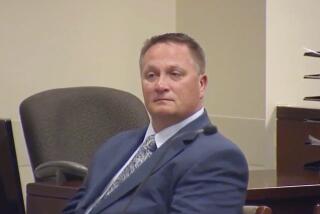Court Halts Cuts in Morphine for Bouvia
In a case he described as being littered with “thorny” questions of medical ethics, a Los Angeles Superior Court judge on Thursday ordered a county hospital to temporarily stop weaning quadriplegic Elizabeth Bouvia from the painkilling drug morphine.
Doctors at High Desert Hospital in Lancaster contend that morphine is an unjustifiably strong pain reliever for Bouvia, a 28-year-old cerebral palsy victim whose bid to starve herself to death has become a cause celebre of the national right-to-die movement. The doctors began gradual morphine reductions last Friday, attempting to terminate use of the drug within about two weeks.
Bouvia’s attorneys have accused the hospital of insensitivity and of violating what they say is Bouvia’s legal right to refuse such a change in medical treatment.
Judge Jack M. Newman signed a temporary restraining order at the request of Bouvia’s attorneys. It requires High Desert doctors to maintain Bouvia’s morphine dosage at Wednesday’s level, which was about 19% below the original dosage. Newman set a May 14 hearing on whether to make the order permanent.
Withdrawal Symptoms
Bouvia’s attorneys, who say she is “clearly addicted” to morphine after six months of daily use, said even the initial reductions have caused withdrawal symptoms, such as stomach cramps.
Newman emphasized that he does “not have very firm inclinations (on) what direction I’m headed” on the morphine issue. He told attorneys for both sides that he wants the May hearing to include expert medical and psychiatric testimony.
The morphine withdrawal was begun by High Desert doctors two days after a state appellate court ruled that Bouvia has an absolute right to refuse any unwanted medical treatment, “even if (it) creates a life-threatening condition.” Doctors have denied there was any connection between the court ruling and cutting back the morphine.
The appellate court ruling forced doctors to remove a feeding tube that had been inserted against Bouvia’s will last January to stop her from starving herself.
Newman said he believes his ruling on morphine withdrawal may have implications “way beyond” Bouvia’s case.
Medical Care
Looking at the issue from Bouvia’s side, he acknowledged that the court needs to be sensitive to her plea against unwanted changes in her medical care. Unlike a private hospital patient who could find another doctor or solicit a second opinion, Bouvia has nowhere to turn but to but the county-funded hospital, he noted.
However, Newman added, a ruling in Bouvia’s favor could encourage a flood of lawsuits challenging medical decisions made by county hospitals and forcing courts to reassess traditional medical issues.
Looking at the case from the hospital’s side, the judge questioned whether it would be appropriate for a court to involve itself in the treatment question if the county can prove that the High Desert doctors have made competent medical decisions.
However, he later noted that statements had been made during the state appellate hearing indicating that Bouvia’s pain from cerebral palsy and arthritis requires morphine. Proof of such claims would sway him toward ruling against the county, he said.
Proved Superior
According to a deposition taken by Bouvia’s attorneys during the appellate court hearing, Bouvia was first put on morphine for pain relief last October, when she was a patient at County-USC Medical Center. A supervising physician, Dr. David Goldstein, said Bouvia was in “severe pain” and that morphine proved superior to weaker painkillers, such as Demerol.
Goldstein also noted that periodically, the medical profession has “had to create addicts to relieve certain patients of their pain,” according to the deposition.
County doctors have said they want to replace Bouvia’s morphine with less severe drugs.
“It’s our intent to make her comfortable. It’s only a matter of which drug we’re going to use,” Deputy County Counsel Steve Carnevale said during the proceedings.
More to Read
Sign up for Essential California
The most important California stories and recommendations in your inbox every morning.
You may occasionally receive promotional content from the Los Angeles Times.









